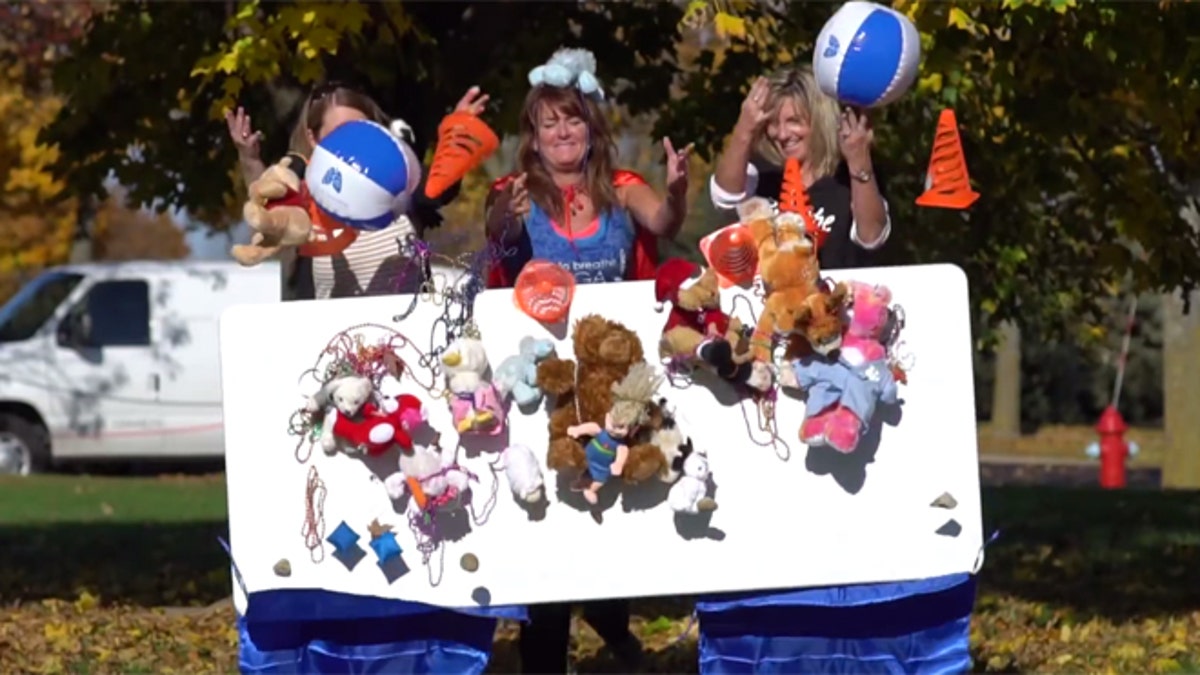
Free To Breathe staff members participate in #FlipToBreathe to help spread awareness and raise money for lung cancer. (Free to Breathe)
Lung cancer results in more deaths each year than breast, prostate and colon cancers combined, yet these cancers receive an average of nearly six times more in research funding per life lost, according to lung cancer research and advocacy nonprofit Free To Breathe. With more than 224,000 people diagnosed with the disease each year, organizers at Free to Breathe are working furiously to help spread awareness and raise money for more treatments to help improve survival rates.
For Lung Cancer Awareness Month, the organization has put together the #FlipToBreathe campaign, where participants are encouraged to flim themselves “flipping out” by literally flipping over objects to vent their frustration over the deadly disease. It’s a social media-based project that has reached more than 260,000 people across Facebook, Twitter, Instagram, Snapchat and HealthUnlocked, with more than $300 raised since it started on Nov. 1.
Sean Lizama, 36, shared his #FlipToBreathe video on Facebook on Oct. 30 to honor his 61-year-old father who died this summer. Lizama said his father, who was his best friend, was a smoker but had quit the habit almost 20 years ago.
“He was diagnosed in the early part of 2013, and he was given six months to a year [to live],” Lizama told FoxNews.com. “He lasted about three and a half years, and it caught up to him just recently beginning of this summer. It was the worst thing I’ve ever experienced.”
Lizama’s video has more than 2,000 views, and features Lizama holding informational posters about lung cancer before he heads to a folding table set up with footballs, bottles and plates that he then lips over.
“I just want people to understand that this is a very horrible thing and the fact that it’s so seriously underfunded, nobody talks about it, it’s not getting the attention and it makes it even worse,” he said. “I want people to know what my dad went through, how he fought to save my life while fighting for his.”
Lizama first became involved with the Free to Breathe organization in 2014 through a Google search. Although he lives in Washington and couldn’t be with his father, who had been receiving chemotherapy and radiation a few states away, he still wanted to get involved in fundraising and spread awareness.
“[Lung cancer] is everywhere, and we all know somebody. We just may not know how many people are going through it,” Lizama said. “Look around at the kids. How many of these kids are going to end up dealing with it? I want people to understand that it could happen to anyone.”
For Sherie Reinders, COO of Free to Breathe, her connection to the disease was her mother.
“When I was 26 years old and recently engaged, my mom was diagnosed with stage 4 lung cancer,” Reinders told FoxNews.com. “She passed away within a short time of her lung cancer diagnosis. She never got to see me in my wedding dress or attend my wedding.”
Reinders said the goal of the #FlipToBreathe campaign is to raise $15,000 for research, as every $100 covers one hour of work. In addition to targeting social media, the organization has a nationwide fundraising series that hosts walks, runs, cycling events and yogathons to raise money. Free To Breathe also hosted its first “Ask Me Anything” session this month, wherein patients, survivors and caregivers could ask researchers and oncologists questions.
Symptoms of lung cancer may present as blood in cough or spit, recurring respiratory infections, enduring cough that is new or different, aches in pain or shoulder, back or chest, trouble breathing, hoarseness or wheezing, exhaustion weakness or loss of appetite, according to Free to Breathe.
While the largest risk factor for the disease is smoking, exposure to radon, secondhand smoke, radiation, asbestos, air pollution, diesel exhaust, arsenic or other organic chemicals may play a role in developing lung cancer. According to Free To Breathe, family history and genetic factors may also affect a patient’s risk, and people who have never smoked account for between 20,000 and 30,000 lung cancer diagnosis each year.
“If you have the ability to breathe, then you can be affected by lung cancer,” Lizama said.








































